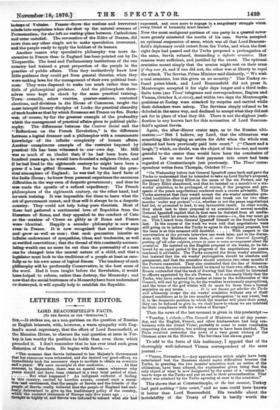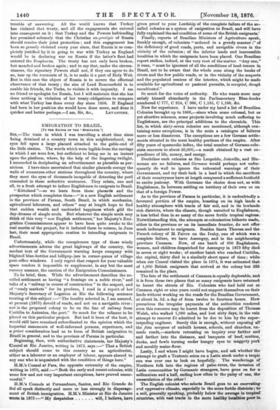LETTERS TO THE EDITOR.
LORD BEACONSFIELD'S FACTS.
[TO THE EDITOR OF THE SPECTATOR."]
SIE,—It strikes me, as a non-partisan on the question of Russian or English interests, with, however, a warm sympathy with Eng- land's moral supremacy, that the effort of Lord Beaconsfield, at the Mansion House, to obscure the real question at issue in Tur- key is less worthy the position he holds than even those which preceded it. I don't remember that he has ever tried such gross distortion of the facts. He begins with Servia
"The moment that Servia intimated to her Majesty's Government that her resources were exhausted, and she desired our good-offices, we immediately took the necessary steps to mediate to obtain an armistice
and a peace. We were successful in that mediation At that moment, in September, there was no special reason whatever why peace should not have been obtained in a very brief period of time.
But what happened ? An indignant outburst of feeling in this country, excited by horrible events, created such a sensa- tion and excitement, that the people of Servia and the friends of the people of Servia really believed that the people of England had sud- denly determined to give up the traditionary policy of the country,
which the eminent statesmen of Europe only five years ago thought so highly of, and Servia was induced to retract what she had expressed, and once more to engage in a sanguinary struggle whieh every friend of humanity must lament."
Now the most malignant partisan of one party in a quarrel never more grossly misstated the merits of his case. Servia accepted an optional suspension of arms, which was all that Lord Beacons- field's diplomacy could extort from the Turks, and when the first eight days had passed and the Turks proposed a prolongation of the same, Servia refused, demanding a definite armistice. Her reasons were sufficient, and justified by the event. The optional armistice meant simply that the armies might rest on their arms if they saw fit, and if one did not, the other was at liberty to repel the attack. The Servian Prime Minister said distinctly, "We wish a real armistice, but this gives us no security." This Turkey re- fused point-blank, and Lord Beaconsfield did not press it. Montenegro accepted it for eight days longer and a third inde- finite term (see Times' telegrams and correspondence, Ragusa and Vienna, October 6, et circa), and within two days the Montenegrin positions at Zaslap were attacked by surprise and carried while their defenders were asleep. The Servians simply refused to be deluded in the same way, and declined to accept what they did not ask for in place of what they did. There is not the slighest justi- fication in any known fact for this accusation of Lord Beacons- field's against Servia.
Again, the after-dinner orator says, as to the Russian ulti- matum :—" But I believe, my Lord, that the ultimatum was something like bringing an action for debt when the whole sum claimed had been previously paid into court." (" Cheers and a laugh,") which, no doubt, was the object of the bon-mot, and more grateful to the orator than would have been the conclusion of peace. Let us see how their payment into court had been regarded at Constantinople just previously. The Times' corre- spondent writes from Therapia, October 31 :— " On Wednesday before last General Ignatieff came back and gave the Turks to understand that he intended to take up Lord Derby's proposal, presented by Sir Henry Elliot in the name of the six Powers, and by Sir Henry Elliot abandoned, and that he insisted on a month's or a six- weeks' armistice, to be prolonged, of course, if the progress and pro- spects of the peace negotiations rendered such a course advisable. The Turks answered that they would accept the six-weeks' armistice pro- vided hostilities after that period should not break out for two other months 'under any pretext '—i.e., whether or not the peace negotiations had led, or promised to lead, to any favourable result. In other words, they stuck fast to their proposal of an armistice of several months. General Ignatieff replied that in that case he desisted from all media. tion, and would let events take their own course—i.e., the war must go on. This I heard from General Ignatieff himself on the Sunday before last. In the course of the week we were told that negotiations were still going on to induce the Turks to agree to the original proposal, but the issue is at this moment still doubtful With respect to the conversation at the private interview one week later, and to the discus- sions with the Ministers since then, it seems that General lunatic', putting off all other subjects, strove to come to some arrangement about the armistice. He insisted on the English proposal of six weeks, to be fol- lowed by an equal period if the progress of the negotiations for peace rendered it advisable. The Turks accepted the three weeks' armistice, but insisted that the six weeks' prolongation should be absolute and permanent, and that the armistice should continuo two other months if the Powers consented. They also contended that the lino of demarca- tion between the two armies should be traced by their own officers, while Russia contended that the task of drawing that line should be intrusted to officers appointed by the six Powers. It is extremely likely that the Turks, who have referred the matter at issue to the deliberation of the Council, will end by giving in, for the weather is extremely unpropitious, and the truce of the god winter will do more for them than a formal armistice on any terms It is not known yet whether the Turks will ultimately accept the six weeks' armistice without any of their absurd conditions as to its two months' prolongation 'in any event,' but if, in the desperate position in which the weather will place their army, they can be induced to give in, we shall know to whom we are indebted for their compliance with the wishes of Europe."
Then the news of the last moment is given in this postscript :— " Tuesday, 1 o'clock.—The Council of Ministers sat all day yester. day, and the English, French, and other Ambassadors had long con- ferences with the Grand Vizier, probably to come to some conclusion respecting the armistice, but nothing seems to have been decided. The Porte received yesterday the news of a very great victory of the Ottoman arms on the Morava. The Servians lost eleven guns."
To add to the force of this testimony, I append that of the thoroughly well-informed Vienna correspondent of the same journal :—
" Vienna, November 5.—Any apprehension which might have been entertained lost the Russians should make difficulties because the Turks, in granting the two months' armistice, took no notice of the ultimatum, have been allayed, the explanation given being that the only object of what is now designated by the name of a ' sommation was to urge on the Turks and put an end to their procrastination. That object was attained by the Turks agreeing at once to the armistice."
This shows that at Constantinople, at the last moment, Turkey had paid nothing "into court," and no man could have known it better than Lord Beaconsfield. His twaddle about the inviolability of the Treaty of Paris is hardly worth the
trouble of answering. All the world knows that Turkey has violated that treaty, and all the engagements she entered into consequent on it ; that Turkey and the Powers befriending her promised solemnly that the Christian ex-protégés of Russia should receive their joint protection ; and this engagement has been so grossly violated every year since, that Russia is as com- pletely justified by it in going to war with Turkey as England would be in declaring war on Russia if the latter's fleet had entered the Bosphorus. The treaty has not only been broken, but mended and broken again ; and to say that, under the circum- stances, the signatary Powers shall not, if they can agree to do so, tear up the remnants of it, is to make it a part of Holy Writ. But in this case the object of Russia is to secure the effectual observance of that treaty ; the aim of Lord Beaconsfield is to enable his friends, the Turks, to violate it with impunity. I am no friend or apologist for Russia, but I will maintain that she has done nothing in violation of her treaty-obligations to compare with what Turkey has done every day since 1856. If England had been in her position she would have done more, and done it
quicker and better perhaps.—I am, Sir, &c., LEVANTINE.







































 Previous page
Previous page